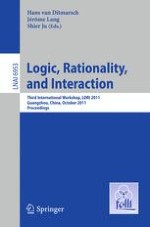Edited in collaboration with FoLLI, the Association of Logic, Language and Information, this book constitutes the refereed proceedings of the Third International Workshop on Logic, Rationality, and Interaction, LORI 2011, held in Guangzhou, China, in October 2011. The 25 revised full papers presented together with 12 posters were carefully reviewed and selected from 52 submissions. Among the topics covered are semantic models for knowledge, for belief, and for uncertainty; dynamic logics of knowledge, information flow, and action; logical analysis of the structure of games; belief revision, belief merging; logics and preferences, compact preference representation; logics of intentions, plans, and goals; logics of probability and uncertainty; logical approaches to decision making and planning; argument systems and their role in interaction; norms, normative interaction, and normative multiagent systems; and logical and computational approaches to social choice.
